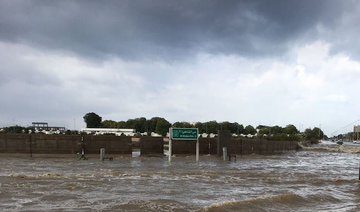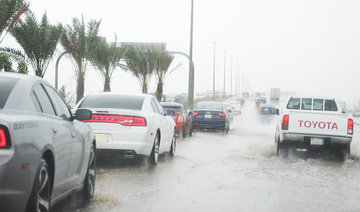JEDDAH: Civil Defense forces rescued 400 people in Makkah region who were trapped due to rainfall, and responded to 250 reports of electrocution, said Makkah Civil Defense spokesman Col. Saeed Sarhan. Two of those electrocuted died, and three are in stable condition.
The Disaster Management Center in Makkah announced the continuation of rainfall in the region, extending to the city of Al-Leith, and warned people against being in valleys.
Makkah Gov. Prince Khalid Al-Faisal has been monitoring the situation at the center along with the deputy governor of Makkah for security affairs, and representatives of all relevant authorities.
Meanwhile, Saudi Attorney General Sheikh Saud Al-Mojeb on Tuesday issued directives to the head of the Public Prosecution Branch in Makkah region and head of the Department of Jeddah province and all branches and departments in all parts of the Kingdom that the Public Prosecution should be fully ready to proceed with all matters related to any cases associated with the recent flash flooding in Jeddah.
He underlined that all officials should carry out their duty “to the fullest extent with no nepotism, and that they have the power to arrest, investigate and prosecute.”
The General Authority for Meteorology and Environmental Protection (GAMEP) said rainfall will continue in the region, and will include Jeddah, Usfan, Dhaban, Bahra, Khulais, Makkah and Taif.
Flooding is expected, accompanied by active surface winds and possible hail showers. Relevant authorities said they have received thousands of calls from citizens and residents.
Sarhan said the rain has caused some damage to public and private properties, and people are urging authorities to investigate the causes of the delay in implementing drainage projects in Jeddah.
He added that coordination rooms have been set up in the Department of Civil Defense for all affected cities and towns. The rain started in Rabigh and continued south through Thuwal, reaching Jeddah. The Civil Defense said the rain has created pools of water that are dangerous to children.
GAMEP said the weather observatory at King Abdul Aziz Airport was struck by lightning, causing damage to the exterior that is being repaired, but the observatory is functioning as normal.
Meanwhile, Border Guards in Makkah activated the Clouds 38 plan, which is designed to support the Civil Defense in case of rain and flooding in the area.
The Search and Rescue Coordination Center for the Red Sea and the Gulf of Aqaba is implementing the plan.
Regular reports are being sent to the coordination center, as per the instructions of the commander of the Border Guards in Makkah, Maj. Gen. Talal bin Ali Al-Shamrani. Search-and-rescue teams are supporting Civil Defense operations when needed.
Border Guards spokesman Maj. Fares Al-Malki urged all citizens and residents to follow the instructions and heed the warnings of the Civil Defense.
Rain brings pain back to Jeddah
Rain brings pain back to Jeddah

Saudi fashion event highlights retail trends, youth culture, and digital innovation

- Speakers noted that the increase in entertainment activities such as concerts and dining in the Kingdom in recent years has led to higher demand for fashion products because people are looking for ways to express themselves
RIYADH: A Riyadh fashion seminar on Sunday brought together industry leaders and creatives to explore the future of Saudi Arabia’s fashion economy.
Hosted by Chalhoub Group at Lakum Art Space, the event featured keynote presentations, panel discussions, and displays by 10 emerging Saudi designers from The Fashion Lab Cohort 2.

The agenda focused on three main themes: the evolution of fashion retail in the Kingdom; the role of cultural identity in building brands; and the rising importance of digital fashion and collaboration.
An awards ceremony honored the standout talents of this year’s cohort: APOA, Awaken, Bucketbox, Mona Al-Shebil, Noble & Fresh, Nora Al-Shaikh, Rebirth, Samar Nasraldin, The Untitled Project and USCITA.
FASTFACT
Hosted by Chalhoub Group at Lakum Art Space, the event featured keynote presentations, panel discussions, and displays by 10 emerging Saudi designers from The Fashion Lab Cohort 2.
One discussion explored consumer behavior in Saudi Arabia, revealing that the local market continues to grow despite global slowdowns.

Speakers noted that the increase in entertainment activities such as concerts and dining in the Kingdom in recent years has led to higher demand for fashion products because people are looking for ways to express themselves.
Retail experiences — both physical and digital — were emphasized as key to engaging Saudi consumers.

Youth culture, streetwear and sports are shaping brand narratives, a panel heard. Speakers discussed how fashion is being used as a tool for cultural storytelling, with an emphasis on grassroots creativity and community building.
Another topic highlighted the power of collaboration between local and international brands. Panelists discussed the importance of long-term partnerships, manufacturing localization, and mentorship to bridge gaps in knowledge and infrastructure.
Speakers also addressed the future of digital fashion, including virtual design, retail innovation, and new marketing strategies targeting Gen Z.
Saudi Arabia’s growing role in shaping the regional and global fashion economy was a prominent theme of the discussions.
First Saudi-Maldives forum to tackle transparency, governance in tourism

- Discussions aim to support sustainable development, promote safe tourism environment
RIYADH: Saudi Arabia — in partnership with the Maldives — is organizing the tourism sector’s inaugural Saudi-Maldives International Forum on Integrity, which is set to take place in the Maldives from May 6 to 7.
The forum is jointly organized by Saudi Arabia’s Oversight and Anti-Corruption Authority, and the Maldives’ Anti-Corruption Commission, in cooperation with the Organisation of Islamic Cooperation.
It will cover key topics such as enhancing transparency and governance in the tourism sector, combating corruption, and boosting international partnerships and expertise exchange among member states and regional and international organizations.
The discussions aim to support sustainable development and promote a trustworthy and safe tourism environment, the Saudi Press Agency reported.
The forum is expected to attract international participation from more than 40 countries and 10 regional and international organizations.
Attendees will include ministers, heads, and representatives of anti-corruption bodies from OIC member states, as well as key international organizations like the UN Office on Drugs and Crime, Interpol, the Global Operational Network of Anti-Corruption Law Enforcement Authorities, and the UN Development Programme. Local and international experts will also take part.
Organizing the forum reflects Saudi Arabia’s commitment to global efforts promoting transparency and accountability in tourism, according to the SPA.
The event highlights Saudi Arabia’s recognition of tourism as a key driver of sustainable development, in line with Vision 2030. It aims to build a thriving tourism sector, diversify national income sources, and stimulate economic growth.
Saudi deputy minister receives Pakistan’s ambassador

- They discussed bilateral relations as well as prominent developments in regional and international arenas
RIYADH: Saudi Deputy Minister for Foreign Affairs Waleed Elkhereiji received Pakistan’s Ambassador to the Kingdom Ahmed Farooq in Riyadh on Sunday.
During the meeting, they discussed bilateral relations as well as prominent developments in regional and international arenas, the Foreign Ministry wrote on X.
Meanwhile, Saudi Deputy Minister for International Multilateral Affairs Abdulrahman Al-Rassi received EU Ambassador to Saudi Arabia Christophe Varno in Riyadh.
Iraqi president invites King Salman to upcoming Arab summits in Baghdad

- Invitation was delivered to Foreign Minister Prince Faisal bin Farhan by Iraqi counterpart
RIYADH: King Salman received an official invitation from Iraqi President Abdullatif Jamal Rashid on Sunday to attend the 34th regular session of the Arab League Council at the summit level, as well as the fifth Arab Economic and Social Development Summit, both set to be hosted by Iraq later this month.
The invitation was delivered to Foreign Minister Prince Faisal bin Farhan during a meeting in Riyadh with Iraqi Deputy Prime Minister and Foreign Minister Fuad Mohammed Hussein, the Saudi Press Agency reported.
The two officials discussed ties between the two countries and reviewed key regional and international developments.
The meeting was also attended by Saud Al-Sati, Undersecretary of the Ministry for Political Affairs.
Riyadh conference discusses future of occupational health

- Minister launches initiatives to enhance Kingdom’s workplace safety
RIYADH: The seventh Global Occupational Safety and Health Conference opened in Riyadh on Sunday under the theme “The Future of Occupational Safety and Health.”
The three-day event was inaugurated by Ahmed Al-Rajhi, minister of human resources and social development and chairman of the National Council for Occupational Safety and Health.
Al-Rajhi launched initiatives to enhance Saudi Arabia’s occupational safety and health system, including the establishment of the National Institute for Occupational Safety and Health, the National Compliance and Excellence Incentives Program, and the Occupational Safety and Health Standards Guide.
Al-Rajhi said that work-related deaths in Saudi Arabia have dropped to less than one per 100,000 workers since the council’s establishment.
Meanwhile, the number of locals in occupational safety and health roles has risen by 130 percent, reaching more than 29,000 by the end of 2024, compared with 2022.
Al-Rajhi also highlighted improvements in safety compliance and automation. “The compliance rate with safety standards reached 72 percent by the end of 2024, and the automation of safety procedures exceeded 62 percent, up from 30 percent in 2020.”
The conference draws high-ranking officials, experts and specialists from Saudi Arabia and worldwide to discuss the future of occupational safety and health, as well as the challenges and opportunities in global labor markets.
It covers six key themes: workplace sustainability; digitization and technology in occupational safety; the economics of safety; the future of research and innovation; emerging challenges; and human behavior and safety culture.
This focus reflects Saudi Arabia’s commitment to improving work environments and achieving professional standards in line with global best practices, a key goal of Saudi Vision 2030.
The event highlights national efforts, displays modern technical trends, supports specialized research, and promotes the Kingdom’s legislative framework to international standards, contributing to the success of major national projects.
Al-Rajhi referred to international reports on workplace challenges. “International reports highlight the serious challenges facing work environments globally. Approximately 3 million worker deaths are recorded each year due to accidents and occupational diseases.”
He said about “395 million non-fatal work injuries occur annually. Statistics show 23 million injuries and 19,000 deaths from heat stress, and 15 percent of workers globally suffer from mental disorders related to stressful work environments.”
The conference program includes specialized scientific sessions, 60 workshops, 20 dialogue sessions, and the Global Occupational Safety and Health Hackathon, where 30 innovative projects are being presented.
An accompanying exhibition features local and international organizations, with several significant agreements expected and new initiatives to advance the Kingdom’s occupational safety system.
The ministry also emphasized the Kingdom’s commitment to securing a healthy work environment and ensuring worker safety, which enhances labor market competitiveness and overall quality of life.
Al-Rajhi said: “In line with Vision 2030, we aim to make work environments safer, higher quality, and more attractive. This supports employee well-being, boosts labor market competitiveness, and fosters a culture of safety and sustainability. Therefore, the Kingdom established the National Council for Occupational Safety and Health.”
The General Organization for Social Insurance launched a directory for occupational safety and health standards at the conference, serving as a unified reference for specialists, establishments, and relevant entities in the Kingdom.
This initiative aims to enhance safety and health standards while protecting workers from occupational hazards, as part of its broader strategy.
Based on international best practices, the directory provides clear preventive standards to help reduce injuries and hazards.
It covers more than 4,500 standards in six main sectors: public industries; construction; agriculture; maritime activities; transport; and mining. It also classifies more than 70 sectors based on the national directory of economic activities.























